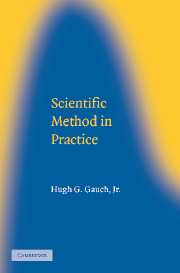Book contents
8 - PARSIMONY AND EFFICIENCY
Published online by Cambridge University Press: 05 March 2015
Summary
The principle of parsimony recommends that from among theories fitting the data equally well, scientists choose the simplest theory. Thus, the fit of the data is not the only criterion bearing on theory choice. Additional criteria include parsimony, predictive accuracy, explanatory power, testability, fruitfulness in generating new insights and knowledge, coherence with other scientific and philosophical beliefs, and repeatability of results. The principle of parsimony has four common names, also being called the principle of simplicity, the principle of economy, and Ockham's razor (with Ockham sometimes Latinized as Occam).
Parsimony is an important principle of the scientific method for two reasons. First and most fundamentally, parsimony is important because the entire scientific enterprise has never produced, and never will produce, a single conclusion without invoking parsimony. Parsimony is absolutely essential and pervasive.
Second and more practically, parsimonious models of scientific data can facilitate insight, improve accuracy, and increase efficiency. Remarkably, parsimonious models can be more accurate than their data. Or, in other terms, parsimonious models can be extremely efficient, requiring considerably less data collection than do more complicated models to achieve the same accuracy and results. These advantages of accuracy and efficiency are important because scientists want to find the truth, but they also want to spend no more time and money finding the truth than is necessary.
This chapter addresses science's evidence, the “E” portion of the PEL model.
Information
- Type
- Chapter
- Information
- Scientific Method in Practice , pp. 269 - 326Publisher: Cambridge University PressPrint publication year: 2002
Accessibility standard: Unknown
Why this information is here
This section outlines the accessibility features of this content - including support for screen readers, full keyboard navigation and high-contrast display options. This may not be relevant for you.Accessibility Information
- 7
- Cited by
